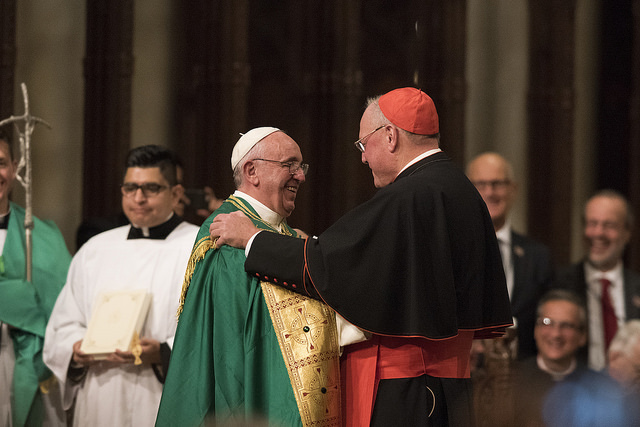Many of you know the words: “And again I say unto you, it is easier for a camel to go through the eye of a needle, than for a rich man to enter into the kingdom of God.” So sayeth Jesus in the New Testament’s Book of Matthew, Chapter 19, Verse 24.
Notwithstanding his encounter with notorious, Kentucky county clerk Kim Davis, the pope’s visit to the United States last week was a success, with millions turning out to get even a glimpse of him. But some had much better views than others. In fact, since before the Reformation, when the Catholic Church sold indulgences – pre-paid, non-stop tickets to heaven for affluent sinners –there has not often been such a display of ecclesiastic, conspicuous consumption and genuflection.
All of which, of course, is more than ironic when you think about the things Pope Francis has said and written about the rich and poor, some of which he expressed during last week’s papal tour.
Back in November 2013, the pope wrote that, “While the earnings of a minority are growing exponentially, so too is the gap separating the majority from the prosperity enjoyed by those happy few… A new tyranny is thus born, invisible and often virtual, which unilaterally and relentlessly imposes its own laws and rules.”
Ideas like that got Kenneth Langone, billionaire founder of Home Depot and major political bankroller of New Jersey’s Chris Christie, a little hot under the collar. You may remember that last year he created a stir when he told Politico that he hoped a rise in populist sentiment against the one percent was not working, “because if you go back to 1933, with different words, this is what Hitler was saying in Germany. You don’t survive as a society if you encourage and thrive on envy or jealousy.”
A year before, in 2013, New York’s Cardinal Timothy Dolan had enlisted the DIY plutocrat to help raise $175 million to restore the grand and elegant St. Patrick’s Cathedral on Fifth Avenue, but in an interview Langone gave to the money network CNBC, he said one of his high rolling potential donors was concerned that the pope was being overly critical of market economies as “exclusionary” and attacking a “culture of prosperity… incapable of feeling compassion for the poor.”
So Langone complained to Cardinal Dolan, and this is how the cardinal says he replied: “‘Well, Ken, that would be a misunderstanding of the Holy Father’s message. The pope loves poor people. He also loves rich people…’ So I said, ‘Ken, thanks for bringing it to my attention. We’ve gotta correct to make sure this gentleman understands the Holy Father’s message properly.’ And then I think he’s gonna say, ‘Oh, OK. If that’s the case, count me in for St. Patrick’s Cathedral.'”

Pope Francis with Cardinal Dolan at Saint Patrick’s Cathedral in NYC for Evening Prayer Vespers (Credit: Jeffrey Bruno)
“Oh, OK?” Oh, brother. Wonder how Pope Francis would have responded to that bit of priestly pragmatism? After all, Francis is the one who wrote, “I prefer a Church which is bruised, hurting and dirty because it has been out on the streets, rather than a Church which is unhealthy from being confined and from clinging to its own security.”
But sure enough, there in the exclusive crowd at St. Patrick’s Cathedral on Fifth Avenue Thursday night, hanging out as the Vicar of Christ celebrated Vespers, was Kenneth Langone, soaking it all in. There, too, reportedly, were a couple of other crony capitalists and St. Patrick’s fundraisers – Frank Bisignano, president and CEO of First Data Corp., and Brian Moynihan, chairman and CEO of Bank of America.
Bisignano, known as “Wall Street’s Mr. Fix-It” used to work for Citigroup and for Jamie Dimon of JPMorgan Chase and reportedly received annual compensation at First Data to the tune of $9.3 million. Moynihan was paid $13 million for 2014, down from $14 million in 2013. Last year, Bank of America, the second largest in the country – but the most hated — made a record-breaking $16.65 billion settlement with the Justice Department to pay up for allegations of unloading toxic mortgage investments during the housing boom. Nice.
But of all the fat cats suddenly in the thrall of the People’s Pope, one was the most impressive. Watching Francis on television Friday afternoon as he met with kids up in East Harlem at Our Lady Queen of Angels primary school, I noticed a well-dressed man hovering near the pontiff. A politician, a government or Vatican official, I wondered? Nope, it was none other than Stephen Schwarzman, head of the giant private equity firm Blackstone.
He was paid a whopping $690 million last year and last week, he and his wife donated $40 million to pay for scholarships to New York City’s Catholic schools. A generous gift for sure, but as Bill Moyers and I wrote in 2012, this is the same Stephen Schwarzman “whose agents in 2006 launched a predatory raid on a travel company in Colorado. His fund bought it, laid off 841 employees, and recouped its entire investment in just seven months — one of the quickest returns on capital ever for such a deal.”
“To celebrate his 60th birthday Mr. Schwarzman rented the Park Avenue Armory here in New York at a cost of $3 million, including a gospel choir led by Patti LaBelle that serenaded him with ‘He’s Got the Whole World in His Hands.’ Does he ever — his net worth is estimated at nearly $5 billion.”
As The Wall Street Journal reported, “The Armory’s entrance [was] hung with banners painted to replicate Mr. Schwarzman’s sprawling Park Avenue apartment. A brass band and children clad in military uniforms ushered in guests… The menu included lobster, baked Alaska and a 2004 Louis Jadot Chassagne Montrachet, among other fine wines.”
It must have seemed like Heaven to some. And what makes this billionaire’s proximity to the pope all the more surreal is that just the morning before, Francis had spoken to Congress in reverent tones of two outspoken, radical, New York Catholics; activist and organizer Dorothy Day – co-founder of the Catholic Worker Movement — and Trappist monk and writer Thomas Merton, each of whom embraced poverty, social justice and resistance.
“We believe in an economy based on human needs rather than on the profit motive,” Day wrote, and Merton worried about “the versatile blandishments of money.” Day wished the church’s bounty to be spread among the needy and not spent on cathedrals and ephemera. And Merton wrote, “It is easy enough to tell the poor to accept their poverty as God’s will when you yourself have warm clothes and plenty of food and medical care and a roof over your head and no worry about the rent. But if you want them to believe you, try to share some of their poverty and see if you can accept it as God’s will yourself.”
Whether the irony struck Stephen Schwarzman is unknown. He himself was probably in too much of a hurry for contemplation. After East Harlem, he rushed off to the White House and that state dinner with Chinese President Xi Jinping. His plus-one was Bridgewater Associates founder Ray Dalio, the billionaire hedge fund manager who infamously told employees they should be like hyenas stalking wildebeest: “It is good for both the hyenas who are operating in their self-interest and the interest of the greater system… because killing and eating the wildebeest fosters evolution (i.e., the natural process of improvement).”
There you have it. In the Bible – right before the camel and the eye of a needle, Jesus says, “If thou wilt be perfect, go and sell that thou hast, and give to the poor, and thou shalt have treasure in heaven: and come and follow me.” Masters of the Universe like Dalio and Schwarzman prefer the Law of the Jungle, buying proximity to holiness and assuaging guilt with cash, all the while upholding savage nature red in tooth and claw.
By the way, Schwarzman’s wife gave the White House dinner a pass. She had a better deal: an excellent, paid in advance seat at the pope’s mass in Manhattan’s Madison Square Garden.




